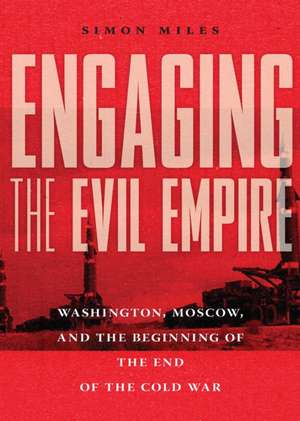Engaging the Evil Empire – Washington, Moscow, and the Beginning of the End of the Cold War
Autor Simon Milesen Limba Engleză Hardback – 14 oct 2020
The received wisdom in diplomatic circles is that the beginning of the end of the Cold War came from changing policy preferences and that President Reagan in particular opted for a more conciliatory and less bellicose diplomatic approach. In reality, Miles clearly demonstrates, Reagan and ranking officials in the National Security Council had determined that the United States enjoyed a strategic margin of error that permitted it to engage Moscow overtly.
As US grand strategy developed, so did that of the Soviet Union. Engaging the Evil Empire covers five critical years of Cold War history when Soviet leaders tried to reduce tensions between the two nations in order to gain economic breathing room and, to ensure domestic political stability, prioritize expenditures on butter over those on guns. Miles's bold narrative shifts the focus of Cold War historians away from exclusive attention on Washington by focusing on the years of back-channel communiqu s and internal strategy debates in Moscow as well as Prague and East Berlin.
--M. E. Sarotte, author of The Collapse
| Toate formatele și edițiile | Preț | Express |
|---|---|---|
| Paperback (1) | 236.57 lei 6-8 săpt. | |
| MB – Cornell University Press – 14 mar 2024 | 236.57 lei 6-8 săpt. | |
| Hardback (1) | 198.85 lei 3-5 săpt. | |
| MB – Cornell University Press – 14 oct 2020 | 198.85 lei 3-5 săpt. |
Preț: 198.85 lei
Nou
Puncte Express: 298
Preț estimativ în valută:
38.05€ • 41.32$ • 31.97£
38.05€ • 41.32$ • 31.97£
Carte disponibilă
Livrare economică 01-15 aprilie
Preluare comenzi: 021 569.72.76
Specificații
ISBN-13: 9781501751691
ISBN-10: 1501751697
Pagini: 248
Dimensiuni: 165 x 236 x 24 mm
Greutate: 0.45 kg
Editura: MB – Cornell University Press
ISBN-10: 1501751697
Pagini: 248
Dimensiuni: 165 x 236 x 24 mm
Greutate: 0.45 kg
Editura: MB – Cornell University Press
Notă biografică
Descriere
"This book is about the beginning of the end of the Cold War between 1980 and 1985. The key shift that allowed the Cold War to end was not one from conflict to cooperation but rather from covert to overt engagement, with both superpowers seeing engagement as a means of furthering their own, primarily competitive, goals"--
